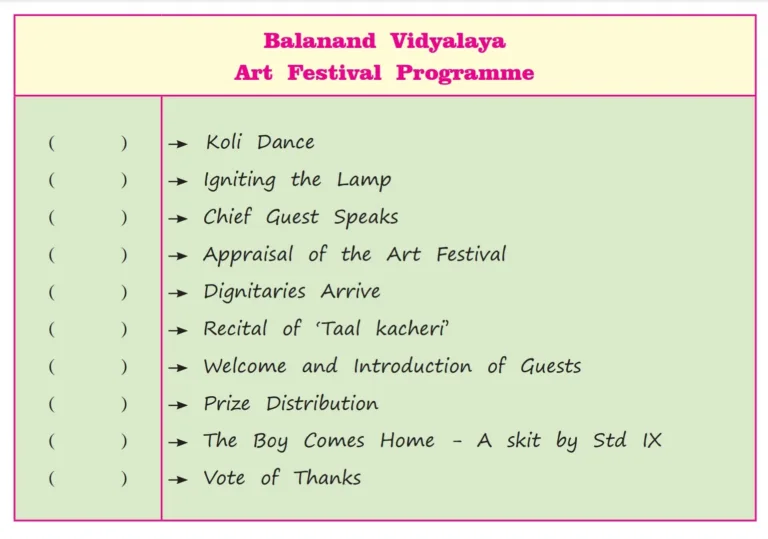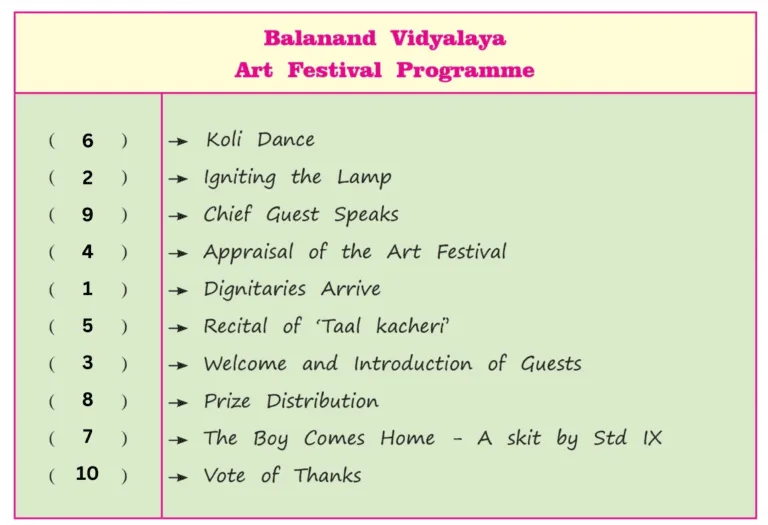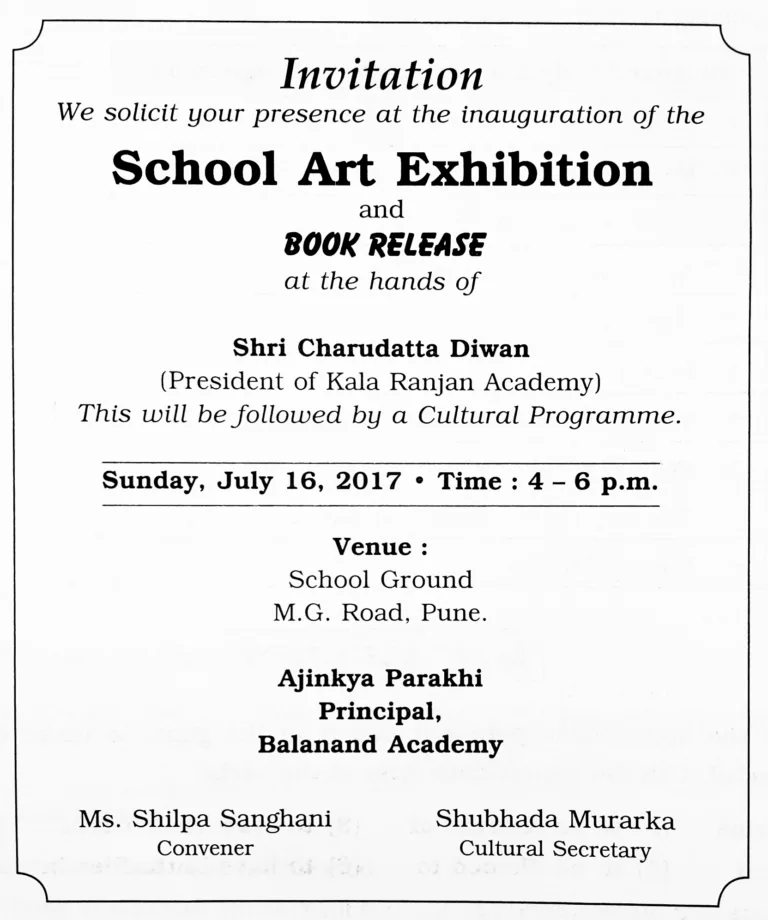Chapter 3.2 - Compere a Programme
In Between the Chapter!
Q1. Why does the compere request the audience to switch off their mobile phones?
Ans: The compere requests the audience to switch off their mobile phones so that they can forget their busy thoughts and work for some time and enjoy the festive occasion. However, I think that this is only the compere’s way of being polite; actually, she wants the mobile phones switched off so that they do not disturb the programme.
Q2. Why does she request them to be seated?
Ans: The dignitaries had arrived and were being escorted to the dais. The programme would soon start, and she requested that the audience be seated.
Q3. At the beginning of the programme, who does the compere address by name?
Ans: At the beginning of the programme, the compere addresses the head girl. Shubhada Murarka is her name.
Q4. Do you have a school song? What does it tell you?
Ans: (Students must write the name of their school song and explain what it conveys.)
Q5. Guess the meaning of : Atithi Devo Bhava!
Ans: “Atithi Devo Bhava” means the guest is equivalent to God.
Q6. What do we learn about Shri. Charudatta Diwan from the compere’s speech?
Ans: From the compere’s speech, we learn that Shri Charudatta Diwan is an eminent personality in the field of art and culture. He is a renowned artist, a painter of international repute, and the proud recipient of many prestigious awards. He is also the president of the Kala Ranjan Academy.
Q7. Who does the compere thank?
Ans: The compere thanks the Principal.
Q8. Who are they?
(i) Mr Avadhoot Pathak
Ans: President of Balanand Academy.
(ii) Ms Shubhada Murarka
Ans: School Captain and Cultural-In-Charge.
(iii) Mr Ajinkya Parakhi
Ans: Principal of Balanand Academy.
Q9. Describe the book that is released.
Ans: The book comprises photographs of all the beautiful and unique pieces of art that are displayed in the auditorium. These are the artistic and skilled contributions of the school’s students.
Q10. Why does the compere thank the Chief Guest?
Ans: The compere thanks the Chief Guest for releasing the special book and formally inaugurating the art festival.
Q11. Who is taking part in the Taal Kacheri?
Ans: Sahil, Varsha, Vivek, Zubin and Govind are taking part in the Taal Kacheri.
Q12. Guess/Find the meaning of Taal Kacheri.
Ans: ‘Taal Kacheri’ means music concert.
Q13. How is this vocal rendition different from music?
Ans: This vocal rendition is different because Sahil was singing the piece, and the same piece would be demonstrated on different instruments.
Q14. Does the compere say the following at the beginning of the programme or after it has ended?
(i) What a wonderful presentation.
Ans: After it has ended.
(ii) That was indeed a fantastic performance!
Ans: After it has ended.
Q15. What is meant by ‘butterflies in your stomach’?
Ans: When you say that you have ‘butterflies in your stomach’ it means that you are very nervous.
ENGLISH WORKSHOP
1. The items in the programme below have got mixed up. Rearrange them in the proper order. Just add the number in the left hand column.

Ans:

2. Form groups of 5-8. This passage tells us only what the compere says. Try to visualise and write what the other people on the dais must have said in their speeches (Write only the main points.)
(a) The School Principal
Ans:
(i) Why is art necessary?
(ii) Importance of art in current scenario.
(iii) Aim of the festival.
(b) The Chief Guest
Ans:
(i) What is art and why it is important.
(ii) How it helps in personality development of students.
(iii) How to promote Art and Culture among students.
(c) The Art teacher who offered vote of thanks
Ans:
(i) Thanking the chief guest.
(ii) Thanking other dignitaries.
(iii) Thanking students for their participation and support.
(iv) Thanking other staff members.
3. Choose the appropriate phrase to insert in the gaps, to make the sentences meaningful. Use the appropriate form of the verb.
(1) to appraise
(2) to be relieved of
(3) to draw the curtain
(4) to escort
(5) to be likened to
(6) to have butterflies in ones stomach
(a) Before we ………., let us stand in attention for the National Anthem.
Ans: draw the curtain
(b) I ………. just as I was to receive my Report Card.
Ans: had butterflies in my stomach
(c) After I took the medicine, I ………. ………. the pain.
Ans: was relieved
(d) Before we do the experiment in the Laboratory, let me ………. you all about it.
Ans: apprise
(e) The minister ………. his personal body-guards.
Ans: was escorted by
(f) Sorrowful times are ………. darkness.
Ans: likened to
4. Prepare a formal invitation card for the Art Festival.
Ans:

5. Prepare a news report in brief on this Art Festival.
Ans:
ART FESTIVAL AT BALANAND
Pune, July 17: The School Art Festival, organised by the Balanand Academy here, was a smashing hit, gathering appreciation from all sections of viewers.
The 3-day Art Exhibition was flagged off last evening. The Chief Guest. Shri Charudatta Diwan, an eminent painter and President of the Kala Ranjan Academy. released a special book of photographs. These were photographs of the unique pieces of art that were displayed in the exhibition. Immediately after this was the formal Inauguration of the festival, followed by an entrancing Cultural Programme. The Taal Kacheri’, the Koll Dance and the light comedy play kept the audience engrossed till the Prize Distribution Ceremony. The Chief Guest’s speech gave everyone wonderful insights into the various aspects of Art and Culture.
After the vote of thanks, the audience dispersed to view the Art Exhibition.
6. Chalk out detailed programmes for the following occasions.
a. The Teacher’s Day programme in your school.
b. An exhibition of science projects arranged in your classroom.
c. A wedding anniversary/birthday celebration for your grandparents that you have arranged with your family.
Ans: (Students must do this on their own.)
Language Study:
Object : Direct and indirect –
An object is a word, phrase or clause that shows the person, thing etc. affected by the action of the verb. The underlined words or phrases in the following sentences are objects.
1. Mother drives a scooter.
2. He gave me a pen.
There are two types of object : direct and indirect. The direct object is directly affected by the action. For example, in sentence 2 above, ‘a pen’ is direct object. An indirect object refers to the person or a thing to whom/for whom the action is done. In sentence 2 above, ‘me’ is an indirect object.
